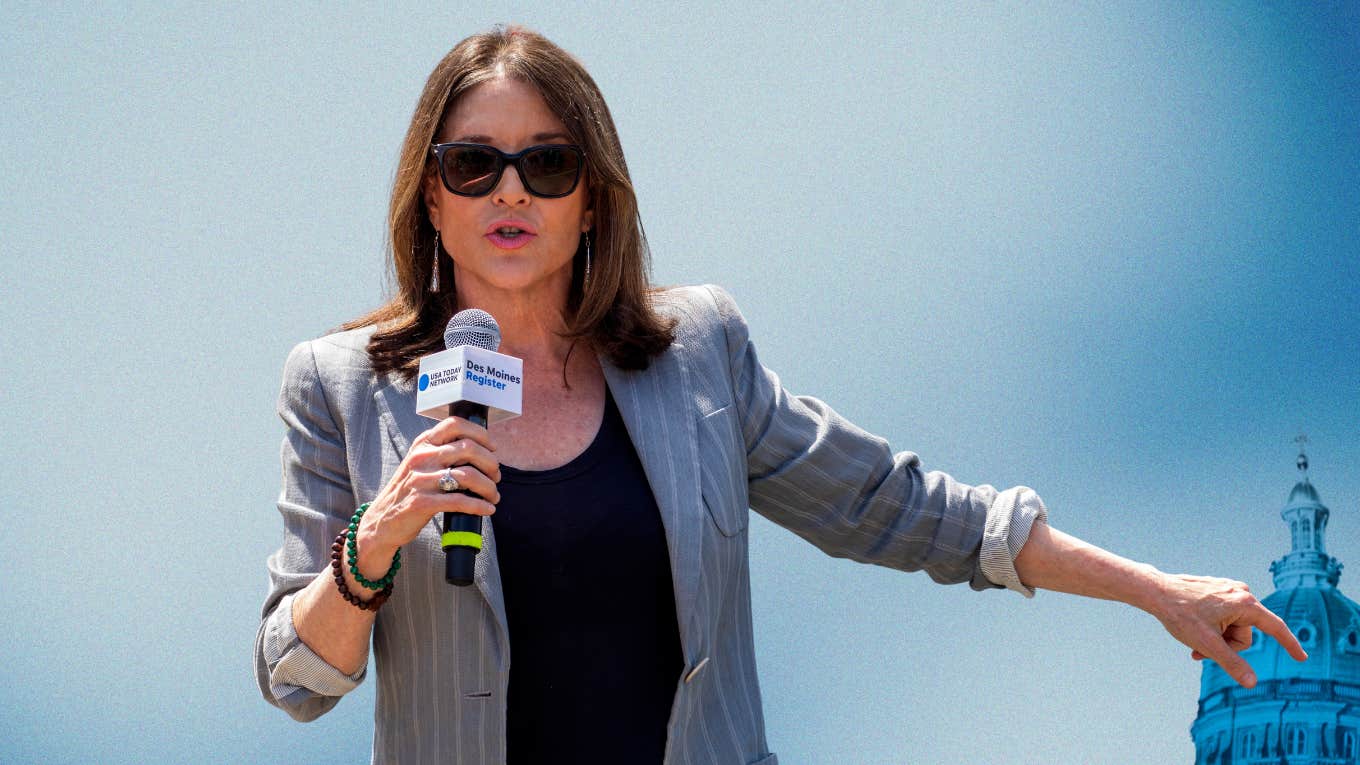What Marianne Williamson Does When Her Heart Gets Broken
Williamson bares her soul and shares the life-changing wisdom for which she's most famous.
 Juli Hansen via Shutterstock | Bianca Marie Arreola via Canva
Juli Hansen via Shutterstock | Bianca Marie Arreola via Canva Let's face it, you don't have to get dumped to have your heart broken. And no matter who you are, you probably experience something like heartbreak every few weeks. For instance, maybe your partner did something that hurt you. Or maybe a friend betrayed your trust. Even worse, maybe your boss humiliated you in front of your coworkers. While these aren't romantic heartbreaks, they hurt all the same!
Author and presidential candidate (once again!) Marianne Williamson has been helping people grow, reach their goals and dreams, and find deeper happiness and fulfillment for years. Now she's facing her own heartbreak, leaving behind her hopes for a future leading the country and getting honest about the big and little heartbreaks she faces in her day-to-day life.
So, what does a leader in personal growth and spirituality do when her heart gets broken?
As the best-selling author of A Return to Love and her latest book, The Mystic Jesus, Williamson sat down with hosts Andrea Miller and Joanna Schroeder to talk about heartbreak, rejection, and personal growth on an episode of the Open Relationships: Transforming Together podcast. She shared stories of her mistakes, struggles, and personal heartbreaks and helped guide the hosts through their own personal challenges while embracing love and finding their personal power.
Marianne Williamson's Belief System
Most famous for teaching A Course in Miracles, which centers around a mystic (and inclusive) form of Jesus, Williamson has been selling out arenas and courses for decades. Some may see this as a contradiction, as she was born into a Jewish family, but the form of Jesus represented in ACIM is one that is open to everyone and doesn't follow the teachings of any individual church.
She explains, "So the exoteric is this very externalized notion of Jesus and an institution and a group of people connected to a church that will tell you and will broker your relationship with him."
However, Williamson believes in a Jesus who is our internal teacher, a guide to whom we can turn for help and support, not some cosmic policeman who wants to punish us or enforce rules. He is available to everyone, and doesn't require a pledge of fidelity or adherence to a set of rules designed around a corporatized church.
She sees Jesus as a loving older brother figure who is further down the path than we are. And if you find yourself confused and don't know where to go? Williamson says, " Reach out in your mind's eye, reach out your hand. As a child would reach out their hand for an elder brother."
With that being said, how can this belief system translate when it comes to forgiveness?
What Marianne Williamson Does When Her Heart Gets Broken
There's no worse feeling than being made fun of. But when this comes from a loved one or a friend? This can be absolutely heart-wrenching. And this is exactly the position Williamson found herself in when a good friend of hers invited her to see a show, and then proceeded to make fun of her on stage.
In the beginning, she found herself drowning in self-pity. She describes it, "She took a slap at me in the play, and I was embarrassed. It was in a town where people knew me, and I just very hurt by it. I was like, what just happened?"
In addition, she was utterly embarrassed. That embarrassment led to anger, as it would for any of us. A friend advised her to pause for a moment before reacting. This pause is where the growth truly happens.
For a while, she sat with this hurt and anger, letting them consume her. Then, she had a sudden and clear thought in her head.
"The Christ in you cannot be crucified," she said. "'The Christ' being the pure love in you, and who you really are."
During hurtful moments like these, Williamson insists that we have a choice: We can choose to play the victim or we can choose to play the victor. You can either choose to be right or choose to be happy. This applies to all aspects of our lives. Can we make better choices to feel happier, more empowered, more driven by love?
This is the power of that pause. Go inside. Find what is holy in you and let that holy self provide your wisdom. Give what you cannot control to God and ask him to help you with it.
When Williamson asked for help, she realized she needed to be honest — but to clear the accusations and pettiness first.
Williamson said to herself, "Something needs to be said, but how are you going to say it? And who are you going to be when you say it?"
Taking that pause created space for the wisdom of God to come in, to guide her, and to help her speak from love (for herself and for her friend) and to prevent her from creating more hurt, more anger, and more resentment in the world — which easily could've
To take a pause and not allow your victim mentality to consume you. To choose instead to allow yourself the grace and kindness to move forward and express that vulnerability head-on.
Marielisa Reyes is a writer with a bachelor's degree in psychology who covers self-help, relationships, career, and family topics.
